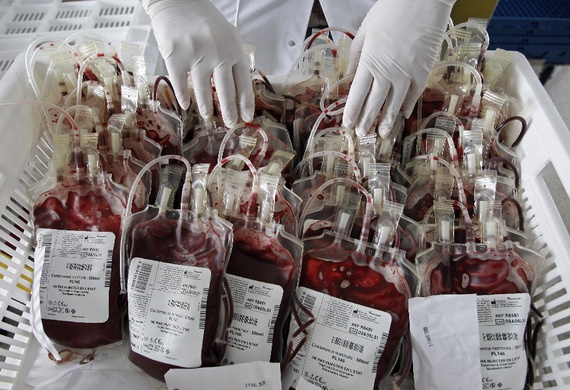
On Tuesday, the U.S. Food and Drug Administration's Blood Products Advisory Committee proposed a reversal of a federal government policy banning homosexual men from donating blood. The existing lifetime ban on blood donations started in the early 1980s and was established to prevent the transmission of HIV at the start of the AIDS epidemic.
While the committee did not take an official vote to move forward in policy change, most members agree that the time has come to lift the ban - even though the Centers for Disease Control and Prevention reports that homosexual and bisexual men are more severely affected by HIV than any other group in the U.S.
As the FDA's website states, "Men who have had sex with other men (MSM), at any time since 1977 (the beginning of the AIDS epidemic in the United States) are currently deferred as blood donors. This is because MSM are, as a group, at increased risk for HIV, hepatitis B and certain other infections that can be transmitted by transfusion."
While this simple statement is clear regarding the reasoning behind the ban, lesbian, gay, bisexual and transgender activists - as well as some members of Congress - have highly criticized the policy in recent years claiming that the policy discriminates against homosexuals.
"We've got the ball rolling. I feel like this is a tide-turning vote," said Ryan James Yezak, an activist who founded the National Gay Blood Drive. "There's been a lot of feet dragging and I think they're realizing it now."
According to the Wall Street Journal, the committee said on Tuesday that "scientific testing of blood has become far more precise and is adequate to ensure that donated blood remains safe."
But blood safety experts have expressed great concern over lifting of the ban, and have asked the FDA to move forward cautiously. The FDA has not released a plan to make any changes based on the committee's recommendations, and is not required to change policy because of its opinion.
Peter Sprigg, a Senior Fellow for Family Policy Studies at the Washington, D.C.-based Family Research Council, spoke to the committee at its Silver Spring, Md. meeting on Tuesday.
"I urge you to oppose any change in the current lifetime deferral as blood donors of men who have had sex with men, unless it can be scientifically proven that a revised policy would result in no increase in risk to the blood supply. Even a small increase in risk is unacceptable."
Sprigg referenced statistics from a CDC report issued in May.
"Gay, bisexual, and other men who have sex with men (MSM)* represent approximately 2% of the United States population, yet . . . [i]n 2010, gay and bisexual men accounted for 63% of estimated new HIV infections in the United States and 78% of infections among all newly infected men," the report reads.
But Sprigg pointed to a minimal benefit to the blood supply based on the small size of the homosexual population.
"Claims, like that of one group, that such a policy change 'could be used to help save the lives of more than 1.8 million people' give the impression that currently 1.8 million Americans per year die due to the current policy. This is completely false."
The CDC reports that 64 percent of newly diagnosed HIV cases in 2012 were males who had sexual contact with other males, and that nearly 60 percent of people living with HIV in the U.S. were homosexual or bisexual males.
But activists still say the lifetime ban is discriminatory and perpetuates negative stereotypes against homosexual men, NBC News reported.
Over the weekend, the White House released a presidential proclamation recognizing World AIDS Day, 2014 - observed on Monday. President Obama expressed his desire to see the U.S. remain a leading nation in fighting the disease. He also went on to say that his administration has made great advances in limiting new infections, and has also reduced HIV-related disparities and health inequalities.
"Despite these gains, too many with HIV/AIDS, especially young Americans, still do not know they are infected; too many communities, including gay and bisexual men, African Americans, and Hispanics remain disproportionately impacted; and too many individuals continue to bear the burden of discrimination and stigma," the proclamation reads.
But the FDA is clear that "its primary responsibility with regard to blood and blood products is to assure the safety of patients who receive these life-saving products."
Sprigg agrees that the safety of those receiving blood transfusions must remain the sole focus of future decisions regarding blood donations and federal policy.
"Political and social considerations should play no role in your advice or decision-making on this issue," he said to the committee. "It should instead be based first, last, and only upon your obligation to maximize the protection of public health."














